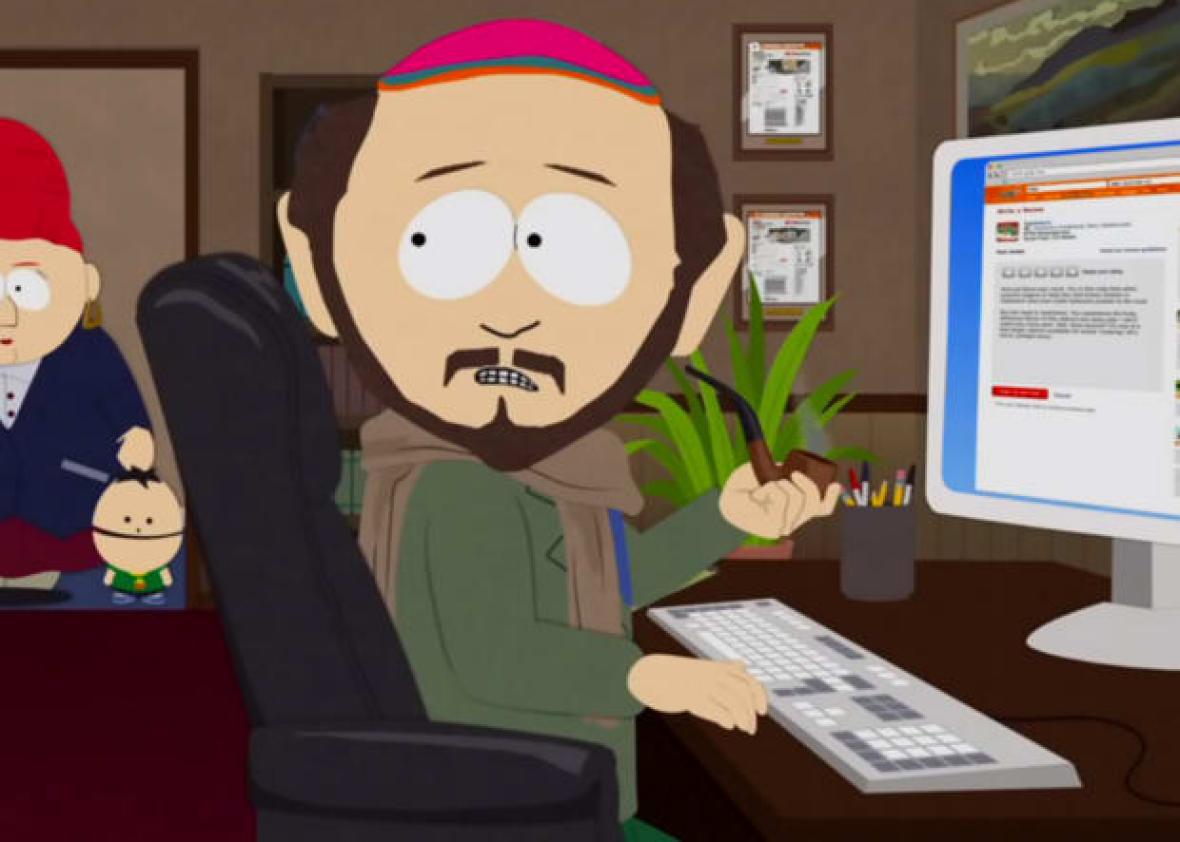In recent years, South Park has turned toward a serialized format, offering extended storylines and more in-depth takes on current events. For creators Trey Parker and Matt Stone, this has been a surprisingly smart strategy. Rushed episodic plots have been replaced by fleshed-out treatments of everything from political correctness to gentrification to trans issues, and because of its tight turnaround time, South Park has been able to closely follow and parody ongoing current events—chiefly, this crazy and soul-crushing election.
Season 20 premiered in September and, true to South Park form, it’s been focused on cultural flashpoints: the nostalgia-reboot craze, social media addiction, the ongoing backlash to “women in comedy.” Its main arc juxtaposes a hopelessly ongoing presidential election—between “Giant Douche,” a Donald Trump model in the form of cast regular Mr. Garrison, and “Turd Sandwich,” a close approximation of Hillary Clinton—with an increasingly drastic global fight against online trolling, spurred by the actions of one (anonymous) “Skankhunt42.” The real-world parallels are obvious—and for the most part, they make for broadly effective satire. But on the subject of trolling, specifically, this season of South Park has been something of a letdown. Instead of going for the jugular—with the kind of comic fearlessness that South Park is known for—the show has taken an uncharacteristically tepid approach.
South Park’s anonymous troll in question is Kyle’s father Gerald, who’s often depicted in the show as an uptight Limousine Liberal. His turn to cyberabuse makes perfect sense in that context: Sitting in a dark basement with a glass of red wine always by his side, Gerald has an outlet to privately express the bottled-up rage and hostility—the desire for adulation, the sense of superiority—that has been a part of his character throughout the show’s run. He fits the profile. But his style of trolling is introduced as relatively tame; while hardly in good taste—early on he says things like, “Hey I’d like to volunteer to kick you in the vagina!” and “Your daughter has a mustache!”—his misogynistic attacks seem to irritate more than shock. (This is confirmed by a montage of women reacting to his comments in the season’s second episode, “Skank Hunt,” in which they appear only casually annoyed.) South Park hardly condones Gerald’s actions, but it does seem to take him at his word when he says, “I’m not really a troll … I just like messing with people because it’s funny.”
The election cycle that has more or less determined the direction of the last two South Park seasons has seen a surge in trolling that is far more toxic than simply calling someone a nasty name. Lately, it’s seemed as if there isn’t one anti-Trump or even neutral political pundit out there who hasn’t been exposed to vile expressions of racism, sexism, and anti-Semitism on Twitter. In an article titled “The Price I’ve Paid for Opposing Donald Trump,” conservative columnist David French wrote: “I distinctly remember the first time I saw a picture of my then-seven-year-old daughter’s face in a gas chamber.” From the moment the topic is introduced on South Park, however, it’s treated much more lightly.
Near the end of “Skank Hunt,” one of Gerald’s high-profile targets—Olympic Gold Medalist Freja Ollegard—publicly responds by saying that she is neither shocked nor saddened by his attacks. The episode’s cliffhanger then hints that the show is about to up the ante—Gerald listens to Freja’s response before crudely saying to himself “Game on, whore, game on”—but we continue to witness only childish insults in the subsequent episode, as when Gerald fakely presents himself as a supporter of Freja’s under the pseudonym “Dr. Juerdo Titsgo.” (That’s Where’d your tits go?, phonetically.) We’re given no reason to believe that Gerald’s behavior has escalated.
But the show then abruptly veers off course: It’s revealed on a news broadcast that Freja has actually jumped off a 29-story building and killed herself, “succumbing to the pressure” of trolling that verged on “horrific,” according to the TV anchor. If things did in fact get worse, South Park doesn’t offer a single piece of evidence—although the episode is comfortable enough showing Freja leap to her death. The fact is that trolling and suicide are indeed linked, but the storyline doesn’t really explore the relationship between them at all; it simply suggests that one leads to the other. For South Park, a show that’s built its reputation on topical comedy that’s dark, relevant, extreme, and ballsy, Twitter trolling seemed like fertile territory for satire. In Episode 6, Gerald is back to trolling again, his insults as pathetic and adolescent as ever. (“Nobody cares about your fat sister with lyme disease, skank!,” he writes in one thread.) By not unpacking the actual dynamics of social media bullying—especially in these anxious political times—South Park is not only diminishing the phenomenon; it’s missing a real comic opportunity and opting for something surprisingly toothless instead.
